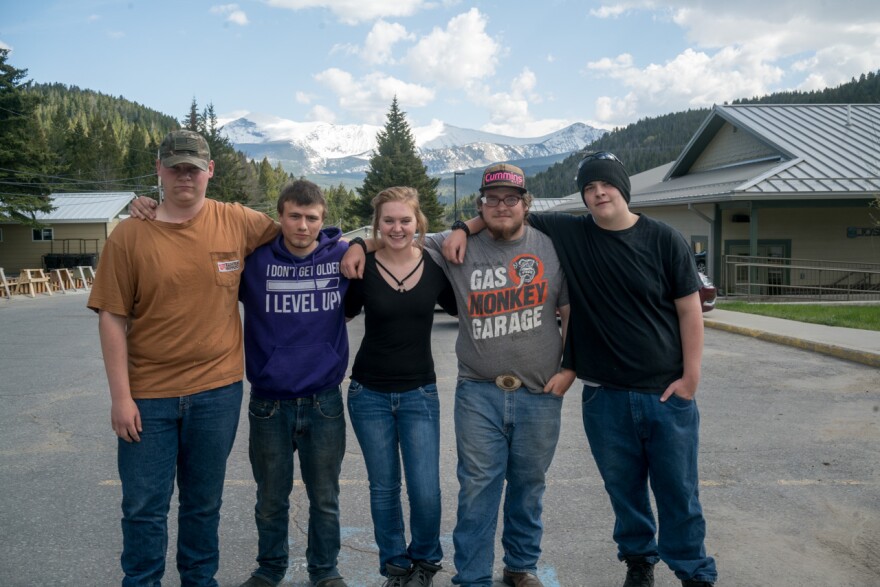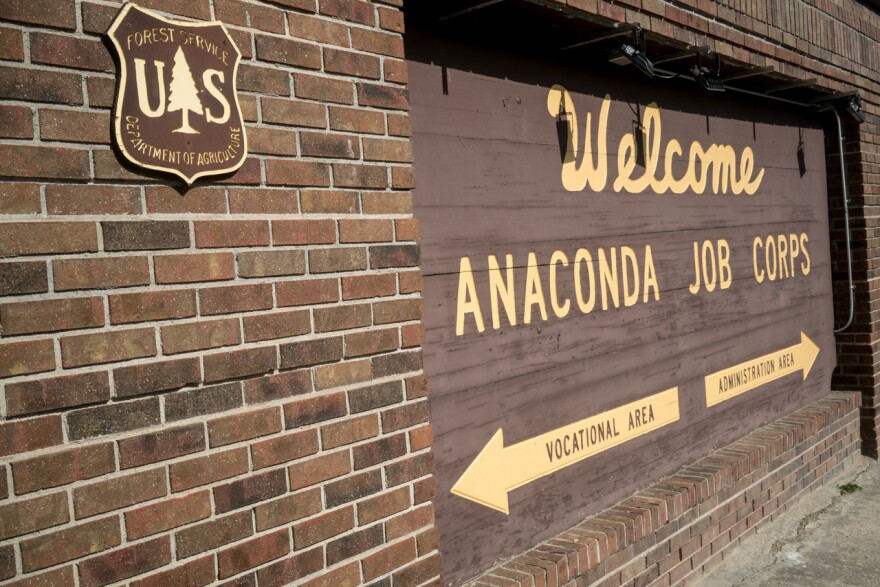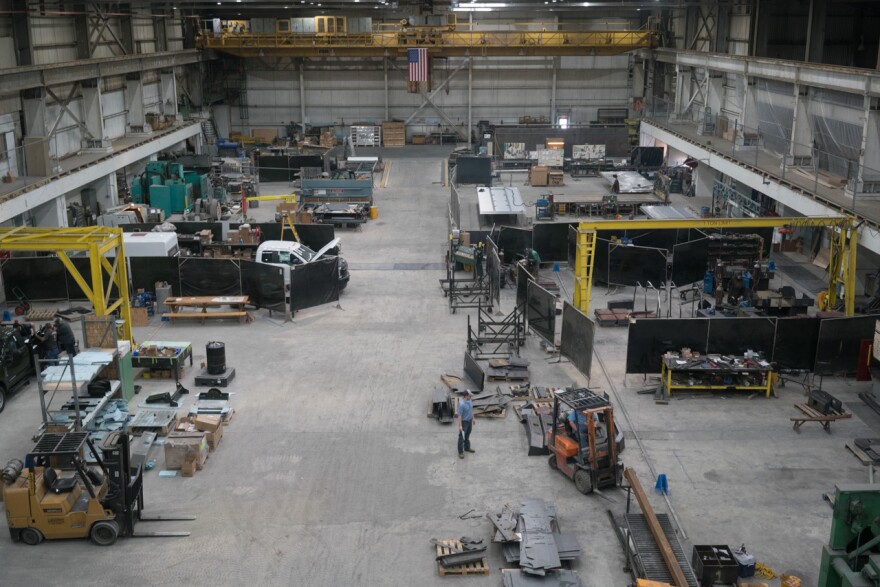The Trump Administration last week announced it’s closing the Anaconda Job Corps, along with eight others across the country. The closure could be devastating to the students and the local community.
It’s 4 p.m. and classes just let out at the Anaconda Job Corps. There’s no cell service up here in the bright green hills west of town. Snow-capped Mt. Haggin stands sentinel above us. So a stranger with a microphone inspires lots of curiosity in the 16-24-year-olds who call this place home. A semi-circle forms around me.
Matt Bowen is 18, and from southern Utah. A trucker cap tames his shaggy hair and white tape holds a corner of his glasses together. He’s learning carpentry and heavy equipment operating here, and he’s been in the program for a little over a year.
"I've learned pretty much everything there is to know about building a house and how to do it the right way. And the instructors here have taught me a lot about work ethic, how to deal with people. It’s just helped a lot. This place shutting down is hard," Bowen says.
According to the Forest Service, the Anaconda Job Corps serves about 350 students each year and pumps about $8 million into the local economy.
It’s one of 25 Forest Service-run Job Corps across the country. According to the announcement last week, nine of those corps in eight states are getting shut down, including this one. The rest will be transferred to management by the Department of Labor or private contractors.
Like Bowen, students come to Job Corps to learn trades like welding, painting, culinary arts and masonry, and to get a GED. Applicants are self-selecting. They live on-site, and it’s totally free of charge. The program caters to students for whom traditional education may not be quite the right fit, or who come from challenging backgrounds.

Hawk McLeod is 21. She’s from Cheyenne, Wyoming and she's learning carpentry and welding.
"I came up here because I was homeless," McLeod says. "But this place gave me the opportunity to learn a trade. I was working 90 hour weeks before I got here to barely make the bills. And this place gave me the opportunity to learn something where I’ll be able to work a 40-hour and make enough money to survive, and actually live."
The U.S. Department of Labor and contractors already manage about 100 Job Corps across the country. Of all those corps, Anaconda is ranked eighth for success, according to Forest Service data. That’s based on factors like retention rate and job placement.
The Department of Labor asked for about $1.3 billion for Job Corps in the 2019 budget, down from $1.7 billion in 2018.
When McLeod heard about the potential closure, her mind started racing.
"I was thinking, I really don’t wanna be homeless again, and what my next steps are."
Students can stay here as long as two years in most cases. Training for a single trade can take between six and 10 months. The students say the corps stopped accepting new enrollees last week, and staff is focused on graduating as many participants as possible before the closure. Students may be transferred to existing facilities, but McLeod worries that they might be full or wouldn’t offer the same experience.
"For a lot of us, this is the closest thing we get to having a home and to having a place where we can have a support group and friends and 70 staff members who care about you succeeding. And losing that is absolutely terrifying, even at my age," McLeod says.
Students here also do community service projects throughout the area. And in local emergencies, they’re the first line of defense. In past years they’ve spent thousands of hours fighting wildland fires. Last winter, they helped dig Anaconda out of a monster snowstorm. Students dug through 40 inches of fresh snow to make safe paths to and from a retirement home, and create access to fire hydrants.
19-year-old Dylan Allen says they filled more than 10,000 sandbags to help locals secure their homes and property from the flood of powder.
When Allen heard the news about the closure, he says, "I was devastated. I’ve seen military bases close in towns before, where the military base, when it closes, the town dies with it; and I don’t wanna see that happen to Anaconda."

Anaconda has a population of less than 10,000. Over the last three decades, that population has gotten smaller and older. That’s a pattern common to lots of rural America.
"There’s always that dark time that everyone in life goes through. It just hit us earlier than it will hit most people," Allen says.
No teachers or staff members agreed to talk with me. But the students here say no one’s quite sure what will happen when the place closes down at the end of August. Its roughly 70 staff members could either be laid-off or transferred. They say everyone’s been tense and morale’s been low since the announcement last week.
"This place is family to me," says Casey Saunders from Great Falls. He’s 18.
"What I would have to say to people is, if you’re willing to tear this place apart, you’re willing to tear apart a family, a bunch of people who were told we were never gonna make it, we were criminals, we were this, we were that. You know, our lives weren’t worth anything, and this place gave us a shot. So if you’re willing to tear down all that, then you’re willing to tear down this family."
Anaconda-resident Amber Puccinelli understands that sense of family. She graduated from the Job Corps here in 2007.
"I mean, it is just ungodly to think that the kids aren’t coming first in this aspect of things," she says.
Puccinelli learned to paint here, and she’s been doing it ever since. She started her own business and continues to come back to help current students.
"It was a wonderful program to get me out on my feet in the world. It was that stepping stone."
This Job Corps has been training students here since 1966. Margie Smith’s seen it from the beginning. Her father was mayor of Anaconda and helped start it up.
"It takes a village. And this is a village, absolutely a village where kids should have the right to come," Smith says.
She also worked here for two decades, until she retired in 2008.
She says she’s been blown away by the changes she’s seen in students over the years, and by the quality of instruction. The Corps offers support on even the smallest details of professional life: how to build a portfolio, write a resume, do a job interview.
"It’s too amazing to let it quit one day. Not one day let it close. Somebody's making a big mistake and they've got a fight on their hands."
An online petition to keep the facility open has already attracted 1,500 signatures, and Democratic Sen. Jon Tester announced Thursday that he’s introducing a bill to stop the closures across the country.
"This is a bunch of garbage, and I’m being generous when I say that," Tester says.
Tester also penned a letter to the departments of agriculture and labor, asking them to reverse their decision.
"I’m sure the people who shut this down never stepped foot in the Anaconda Job Corps, maybe never stepped foot in Montana, maybe never stepped foot in rural America," he says.
Last week, Republicans Sen. Steve Daines and Rep. Greg Gianforte also wrote a letter urging the labor department to change its mind in Anaconda — but not for other Job Corps slated for closure.
According to a Department of Labor release, the government reviewed outcomes, performance, cost and other measures of the Job Corps program to make its decision. Republican Sen. Steve Daines says that rationale doesn’t make sense.
"There’s never a good time to get this news. This is a horrible time to get this news. So we’re gonna do everything we can here to reverse that decision."
All of Montana’s congressional delegation say Job Corps is crucial to the Anaconda economy.
That’s in part because students there get real-world experience at local businesses, like here at Intercontinental Truck Body. ITB modifies trucks for the military and private industry. Operations Manager Cory Rilley is guiding me through the sparks and machines of the warehouse.

"Job Corps students will come in and work with one of our technicians in helping to tear down these chassis," Rileys says.
Students hack apart and reassemble truck bodies, like Dr. Frankenstein wielding a welder.
"So this is one area where we use those Job Corps students, and they’re able to gain different skills and knowledge in the real-world application."

Riley says the company moved here from Conrad less than a year ago, but they’ve already had 21 Job Corps students come through to get experience. These students work 36 hours every other week for about three months — and they get paid for their labor.
"Well I think it’s win-win on both parts. It’s just a great program in general."
They’ve also hired a graduate of the program as a welder. The Job Corps’ welding program in particular offers specialized, advanced training. It’s created a jumping-off point for well-paying positions at companies like Montana Precision Products, an aerospace company in Butte.
Jim Davison, executive director of the Anaconda Local Development Corporation, says Job Corps has been a vital part of the Anaconda community since it began; and across the state, the labor force is facing a shortage of skilled workers.
"Our workforce is shrinking," he says. "So where’s our new workforce gonna come from? How do we fill those slots as people retire? How do we find them and how are they trained?"
If the Anaconda facility closes, only Darby will continue to have a Jobs Corps site in Montana. It’s about the same size as the Anaconda’s Corps. Management there will be transferred from the Forest Service to the Department of Labor or a contractor.


